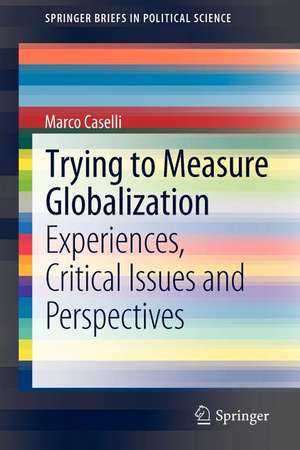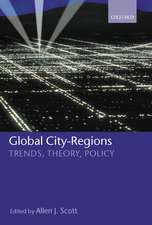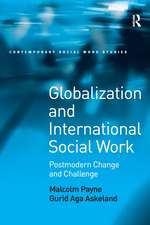Trying to Measure Globalization: Experiences, critical issues and perspectives: SpringerBriefs in Political Science, cartea 4
Autor Marco Casellien Limba Engleză Paperback – 5 ian 2012
Din seria SpringerBriefs in Political Science
-
 Preț: 410.94 lei
Preț: 410.94 lei -
 Preț: 259.57 lei
Preț: 259.57 lei -
 Preț: 375.62 lei
Preț: 375.62 lei -
 Preț: 478.53 lei
Preț: 478.53 lei -
 Preț: 411.16 lei
Preț: 411.16 lei -
 Preț: 379.48 lei
Preț: 379.48 lei -
 Preț: 226.22 lei
Preț: 226.22 lei -
 Preț: 378.71 lei
Preț: 378.71 lei -
 Preț: 342.25 lei
Preț: 342.25 lei -
 Preț: 379.48 lei
Preț: 379.48 lei -
 Preț: 443.58 lei
Preț: 443.58 lei -
 Preț: 125.07 lei
Preț: 125.07 lei -
 Preț: 358.32 lei
Preț: 358.32 lei -
 Preț: 475.65 lei
Preț: 475.65 lei -
 Preț: 379.48 lei
Preț: 379.48 lei -
 Preț: 375.84 lei
Preț: 375.84 lei -
 Preț: 378.54 lei
Preț: 378.54 lei -
 Preț: 342.84 lei
Preț: 342.84 lei -
 Preț: 379.68 lei
Preț: 379.68 lei -
 Preț: 309.04 lei
Preț: 309.04 lei - 15%
 Preț: 520.30 lei
Preț: 520.30 lei -
 Preț: 380.84 lei
Preț: 380.84 lei -
 Preț: 374.85 lei
Preț: 374.85 lei -
 Preț: 377.73 lei
Preț: 377.73 lei -
 Preț: 378.54 lei
Preț: 378.54 lei -
 Preț: 444.94 lei
Preț: 444.94 lei -
 Preț: 374.85 lei
Preț: 374.85 lei -
 Preț: 379.86 lei
Preț: 379.86 lei -
 Preț: 476.21 lei
Preț: 476.21 lei -
 Preț: 377.73 lei
Preț: 377.73 lei -
 Preț: 444.13 lei
Preț: 444.13 lei -
 Preț: 446.65 lei
Preț: 446.65 lei -
 Preț: 444.52 lei
Preț: 444.52 lei -
 Preț: 376.59 lei
Preț: 376.59 lei -
 Preț: 376.59 lei
Preț: 376.59 lei -
 Preț: 375.07 lei
Preț: 375.07 lei -
 Preț: 261.53 lei
Preț: 261.53 lei -
 Preț: 376.22 lei
Preț: 376.22 lei -
 Preț: 259.57 lei
Preț: 259.57 lei -
 Preț: 380.07 lei
Preț: 380.07 lei -
 Preț: 261.32 lei
Preț: 261.32 lei -
 Preț: 375.45 lei
Preț: 375.45 lei -
 Preț: 310.18 lei
Preț: 310.18 lei -
 Preț: 378.54 lei
Preț: 378.54 lei - 5%
 Preț: 356.11 lei
Preț: 356.11 lei -
 Preț: 477.34 lei
Preț: 477.34 lei -
 Preț: 343.72 lei
Preț: 343.72 lei - 15%
 Preț: 462.05 lei
Preț: 462.05 lei -
 Preț: 379.30 lei
Preț: 379.30 lei -
 Preț: 378.71 lei
Preț: 378.71 lei
Preț: 379.86 lei
Nou
Puncte Express: 570
Preț estimativ în valută:
72.71€ • 79.00$ • 61.12£
72.71€ • 79.00$ • 61.12£
Carte tipărită la comandă
Livrare economică 21 aprilie-05 mai
Preluare comenzi: 021 569.72.76
Specificații
ISBN-13: 9789400728066
ISBN-10: 9400728069
Pagini: 152
Ilustrații: IX, 139 p.
Dimensiuni: 155 x 235 x 18 mm
Greutate: 0.22 kg
Ediția:2012
Editura: SPRINGER NETHERLANDS
Colecția Springer
Seria SpringerBriefs in Political Science
Locul publicării:Dordrecht, Netherlands
ISBN-10: 9400728069
Pagini: 152
Ilustrații: IX, 139 p.
Dimensiuni: 155 x 235 x 18 mm
Greutate: 0.22 kg
Ediția:2012
Editura: SPRINGER NETHERLANDS
Colecția Springer
Seria SpringerBriefs in Political Science
Locul publicării:Dordrecht, Netherlands
Public țintă
ResearchCuprins
Contents.- Introduction.- 1. Globalization: in search of definition of a controversial concept.- 2. Measuring complexity.- 3. Measuring globalization: the state-based approach.- 4. Globalization indices based on states: a comparism and some criticism.- 5. Alternative approaches and conclusions.
Textul de pe ultima copertă
This Briefs conducts a critical survey of the main tools devised for the synthetic measurement of globalization processes. To this end, the first part of the Briefs discusses the meaning of the concept considered, highlighting the different and often contradictory interpretations put forward in its regard in the literature. Subsequently analysed are the passages and issues that must be addressed when constructing an instrument intended to measure a social phenomenon of such complexity as globalization. Stressed in particular is that the researcher’s subjectivity is repeatedly involved in these passages, so that no instrument can have objective validity. Given these premises, the Briefs presents the principal tools employed in attempts to measure globalization, starting with those whose unit of analysis is the state. In this regard, particular space is devoted to indexes which take a multidimensional approach to the concept of globalization. There follows a comparison among the results obtained using these indexes, and criticisms are made of the ways in which the latter have been constructed. A limitation, or if one wishes a paradox, concerning such tools is that they measure in relation to states a process which has as one of its principal features the fact that it extends beyond the confines of states. For this reason, the final chapter considers whether globalization can be measured with different units of analysis – in particular people and cities. The Briefs concludes with discussion of the general limitations of globalization indexes.
Caracteristici
This Briefs presents a basically and complete review of the existing globalization indexes This Briefs is both interesting for scholars and academic library Includes supplementary material: sn.pub/extras
















